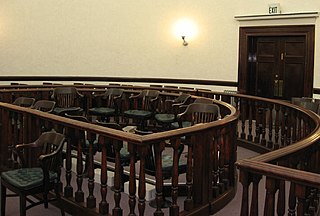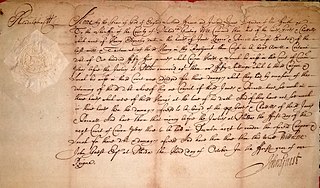Related Research Articles

United States appellate procedure involves the rules and regulations for filing appeals in state courts and federal courts. The nature of an appeal can vary greatly depending on the type of case and the rules of the court in the jurisdiction where the case was prosecuted. There are many types of standard of review for appeals, such as de novo and abuse of discretion. However, most appeals begin when a party files a petition for review to a higher court for the purpose of overturning the lower court's decision.

The Seventh Amendment to the United States Constitution is part of the Bill of Rights. This amendment codifies the right to a jury trial in certain civil cases and inhibits courts from overturning a jury's findings of fact.

A jury is a sworn body of people (jurors) convened to render an impartial verdict officially submitted to them by a court, or to set a penalty or judgment. Juries developed in England during the Middle Ages and are a hallmark of the Anglo common law legal system. They are still commonly used today in the United Kingdom, the United States, Canada, Ireland, Australia, and other countries whose legal systems are descended from English and later British legal traditions.
A lawsuit is a proceeding by a party or parties against another in the civil court of law. The archaic term "suit in law" is found in only a small number of laws still in effect today. The term "lawsuit" is used in reference to a civil action brought by a plaintiff demands a legal or equitable remedy from a court. The defendant is required to respond to the plaintiff's complaint. If the plaintiff is successful, judgment is in the plaintiff's favor, and a variety of court orders may be issued to enforce a right, award damages, or impose a temporary or permanent injunction to prevent an act or compel an act. A declaratory judgment may be issued to prevent future legal disputes.

In common law, a writ is a formal written order issued by a body with administrative or judicial jurisdiction; in modern usage, this body is generally a court. Warrants, prerogative writs, subpoenas, and Certiorari are common types of writ, but many forms exist and have existed.
Jury nullification (US/UK), jury equity (UK), or a perverse verdict (UK) describes a not guilty verdict of a criminal trial's jury despite a defendant having clearly broken the law. Reasons may include beliefs that: the law itself is unjust, the prosecutor has misapplied the law in the defendant's case, the punishment for breaking the law is too harsh, or general frustrations with the criminal justice system. Some juries have also refused to convict due to their own prejudices in favor of the defendant. Such verdicts are possible because a jury has an absolute and unqualified right to reach any verdict it chooses, although they are usually not told of this right in the process of a trial.
In United States law, a motion is a procedural device to bring a limited, contested issue before a court for decision. It is a request to the judge to make a decision about the case. Motions may be made at any point in administrative, criminal or civil proceedings, although that right is regulated by court rules which vary from place to place. The party requesting the motion may be called the moving party, or may simply be the movant. The party opposing the motion is the nonmoving party or nonmovant.
Batson v. Kentucky, 476 U.S. 79 (1986), was a landmark decision of the United States Supreme Court ruling that a prosecutor's use of a peremptory challenge in a criminal case—the dismissal of jurors without stating a valid cause for doing so—may not be used to exclude jurors based solely on their race. The Court ruled that this practice violated the Equal Protection Clause of the Fourteenth Amendment. The case gave rise to the term Batson challenge, an objection to a peremptory challenge based on the standard established by the Supreme Court's decision in this case. Subsequent jurisprudence has resulted in the extension of Batson to civil cases and cases where jurors are excluded on the basis of sex.
The writ of coram nobis is a legal order allowing a court to correct its original judgment upon discovery of a fundamental error that did not appear in the records of the original judgment's proceedings and would have prevented the judgment from being pronounced. The term "coram nobis" is Latin for "before us" and the meaning of its full form, quae coram nobis resident, is "which [things] remain in our presence". The writ of coram nobis originated in the courts of common law in the English legal system during the sixteenth century.
Strauder v. West Virginia, 100 U.S. 303 (1880), was a landmark decision of the Supreme Court of the United States about racial discrimination and United States constitutional criminal procedure. Strauder was the first instance where the Supreme Court reversed a state court decision denying a defendant's motion to remove his criminal trial to federal court pursuant to Section 3 of the Civil Rights Act of 1866.
A fieri facias, usually abbreviated fi. fa., is a writ of execution after judgment obtained in a legal action for debt or damages for the sheriff to levy on goods of the judgment debtor.
A new trial or retrial is a recurrence of a court case. A new trial may potentially be ordered for some or all of the matters from the original trial. Depending upon the rules of the jurisdiction and the decision of the court that ordered the new trial, a new trial may occur if:
Baylis v. Travelers' Insurance Company, 113 U.S. 316 (1885), was a case where after close of testimony in a trial, the defendant moved to dismiss on the ground of the insufficiency of the evidence to sustain a verdict. This motion was denied and the plaintiff asked that the case be submitted to the jury to determine the facts on the evidence. The court refused this, and plaintiff excepted. The court then ordered a verdict for plaintiff, subject to its opinion, whether the facts proved were sufficient to render defendant liable to plaintiff on the cause of action stated. Plaintiff moved for judgment on the verdict, and defendant moved for judgment on the pleadings and minutes of trial. Judgment was rendered for defendant upon an opinion of the court as to the effect of the evidence and as to the law on the facts as deduced from it by the court. Held that the plaintiff was thereby deprived of his constitutional right to a trial by jury, which he had not waived, and to which he was entitled.
The Virginia Circuit Courts are the state trial courts of general jurisdiction in the Commonwealth of Virginia. The Circuit Courts have jurisdiction to hear civil and criminal cases. For civil cases, the courts have authority to try cases with an amount in controversy of more than $4,500 and have exclusive original jurisdiction over claims for more than $25,000. In criminal matters, the Circuit Courts are the trial courts for all felony charges and for misdemeanors originally charged there. The Circuit Courts also have appellate jurisdiction for any case from the Virginia General District Courts claiming more than $50, which are tried de novo in the Circuit Courts.
This collection of lists of law topics collects the names of topics related to law. Everything related to law, even quite remotely, should be included on the alphabetical list, and on the appropriate topic lists. All links on topical lists should also appear in the main alphabetical listing. The process of creating lists is ongoing – these lists are neither complete nor up-to-date – if you see an article that should be listed but is not, please update the lists accordingly. You may also want to include Wikiproject Law talk page banners on the relevant pages.
Ludwig v. Massachusetts, 427 U.S. 618 (1976), was a case in which the Supreme Court of the United States held that the Massachusetts two-tier court system did not deprive Ludwig of his U.S. Const., Amend. XIV right to a jury trial and did not violate the double jeopardy clause of the U.S. Const., Amend. V.
A special jury, which is a jury selected from a special roll of persons with a restrictive qualification, could be used for civil or criminal cases, although in criminal cases only for misdemeanours such as seditious libel. The party opting for a special jury was charged a fee, which was 12 guineas just prior to abolition in England.
Evans v. Eaton, 16 U.S. 454 (1818), was a United States Supreme Court case in which the Court held that a patent disclosing an improved method of manufacture by means of several different improved machines should be construed to claim both the method and the improvements to the machines, but not to include the machines apart from the inventor's improvements.
Ex parte Wood, 22 U.S. 603 (1824), was a United States Supreme Court case in which the Court held that a patent could not be repealed based on summary proceedings without the opportunity for a jury trial. The case exemplifies a tradition in early 19th century United States patent caselaw in which patents were regarded specifically as an absolute property right to exclusive use of the invention, rather than requiring a balancing between public and private interests.
Burks v. United States, 437 U.S. 1 (1978), is a United States Supreme Court decision that clarified both the scope of the protection against double jeopardy provided by the Fifth Amendment to the United States Constitution and the limits of an appellate court's discretion to fashion a remedy under section 2106 of Title 28 to the United States Code. It established the constitutional rule that where an appellate court reverses a criminal conviction on the ground that the prosecution failed to present sufficient evidence to prove the defendant's guilt beyond a reasonable doubt, the Double Jeopardy Clause shields the defendant from a second prosecution for the same offense. Notwithstanding the power that appellate courts have under section 2106 to "remand the cause and direct the entry of such appropriate judgment, decree, or order, or require such further proceedings to be had as may be just under the circumstances," a court that reverses a conviction for insufficiency of the evidence may not allow the lower court a choice on remand between acquitting the defendant and ordering a new trial. The "only 'just' remedy" in this situation, the Court held, is to order an acquittal.
References
| Look up venire , venire facias , or venire facias de novo in Wiktionary, the free dictionary. |